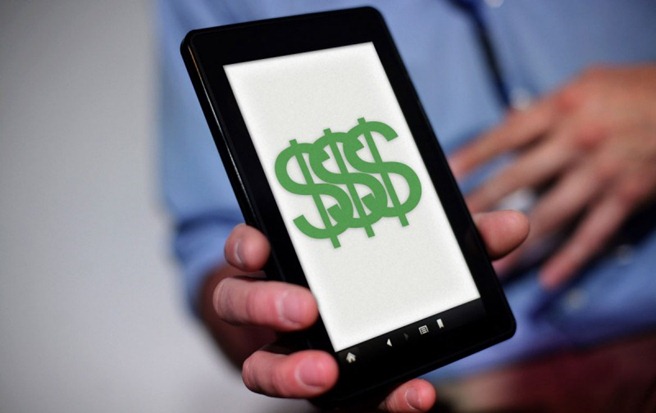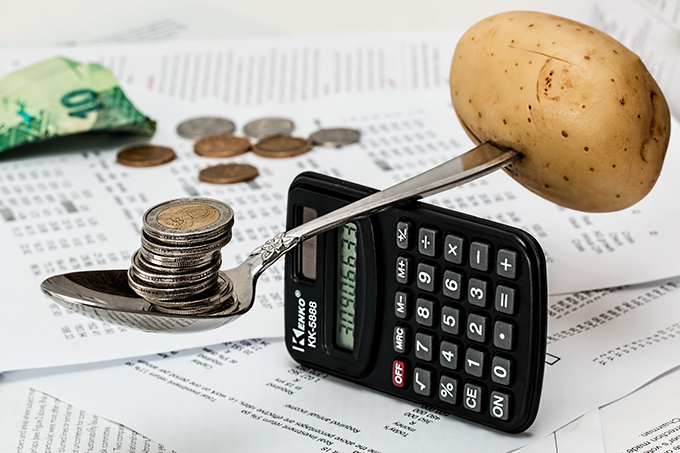Factors to Consider When Pricing Your Ebook
Unless you’re a particularly confident author, deciding on a retail price for your ebook can be a daunting task. Like any creative art, it’s difficult to place a credible value on your work that helps you make a tidy profit off your manuscript, without scaring away potential readers.
Whereas it would be nice if we could all charge the sort of prices that the likes of Stephen King, Veronica Roth or Danielle Steel can, authors just starting out on their writing warpath often have to go for much lower prices.

With this in mind, below are nine pointers you can use to help you pinpoint the ideal price for your ebook. They act as a series of questions that you need to ask yourself to encourage new readers to approach your work. You will soon find yourself striking that all important balance between earning money from your work and reaching out to old and new readers.
Charges must be reasonable
How to price your book is one of the most difficult questions to answer, especially when this is your debut novel. But it’s a good point to remember that an ebook is, of course, not printed. It goes without saying that ebooks are very often cheaper than their printed counterparts.
And it’s for the simple reason that there is far less in terms of materials needed in terms of producing the book (there’s no paper, no printing costs, no publishing fees, and no postage and packaging involved, for instance). Put another way, ebooks can cost almost nothing to produce, especially when you’re writing and formatting into the final digital version.
A quick check of ebooks available online will give you a reasonable idea of the general prices other authors are charging. The few costs you might incur may well be in terms of editing and formating the books for you – otherwise there’s nothing.

Given that there’s also so many possibilities to create an ebook even with limited technology and resources, many readers just wouldn’t want to pay a high price. Competition is also very high, so you’ve got your work cut out.
Market Demand
If you’re writing about teenage vampires trying to make it through high school, but nobody wants to read this genre, you’ll find your book slipping into oblivion on the book charts. If everyone is writing in the same sort of genre (or you are up against people with a stellar reputation, such as Agatha Christie, JK Rowling, Roald Dahl, and the like), you’ll likely have to set the bar low and go with a lower price to begin with.
Only once you’ve established your reputation as an author not to be messed with can you start expanding your wings and exploring other opportunities. Having said that, if there’s plenty of demand for the genre you’re interested in, you’ll find that your work gets picked up pretty quickly. Remember that phase when just about every YA book seemed to be about vampires?

The key here is to create that unique twist to your story-line that will make your manuscript stand out and beat all the other competition in the ebook market. Susan Collins‘ “Hunger Games” trilogy is a good example of how a genre can be remodeled to popular effect. Taking the dystopian novel and removing adults struggling against technology, Collins has instead remodeled it using younger protagonists and a less advanced society.
Competitive comparison
Look at the genre you’ve chosen to write in, and then compare the price you want to charge against other books in the same genre currently being sold. By looking at what other authors of similar books are charging, you’ll find the best advice for zoning in on a more appropriate price for your work.
With current market prices now acting as your benchmark, it’ll likely help you shift more ebooks too. At the beginning, you can consider pricing what you’ve written at a slightly lower price, just to help you gain traction and trust factor (which we’ll get to in a bit).
At the same time, the lower price will start to drum up interest as people experiment with new books but not wish to pay much to begin with. It will also encourage those impulse buys, the readers who just decide on a whim to buy your book.
Once you’ve got that base on which to build (and a few good reviews), you can then push your prices up as readers will have less of an issue paying up.
There is, however, a smart way to monetize your ebooks without charging your readers at all. Using an authoring tool like Kotobee Author, you can publish ebooks as native book apps (for smartphones) and simply enable Google Admobs. That way, you’d gain some reasonable revenue from the ads instead.
Unique content equals added value
Another question you need to ask yourself is: How far does your ebook stand out from other ebooks of similar content?
Potential readers simply won’t see it as a good investment if your ebook’s content is essentially similar to others out there. And just as readers want to spend their money on something useful, it does you no harm if your content solves a particular problem, or provides solutions that readers can’t find elsewhere.
Think of Elizabeth Gilbert‘s bestseller “Eat, Pray, Love“, which zoned in on a highly Western approach to spirituality that her target audience could relate to and identify with. It took off simply because it spoke to her audience, essentially ordinary Western spiritual seekers, in a way that few other books have done.

Also take into account that your ebook will have added “unique” factor if you’ve written it from a particular perspective or point of view, opinions, insights and knowledge on a topic. Taking these points into account means you’ll easily increase your content’s worth, and should be going through your mind when you’re thinking about how to price your ebook.
The beauty with ebooks is that your unique content can be in the form of adding more advanced interactive elements. Read this article for more: 5 hacks for creating a more engaging ebook
How much content have you included in your ebook?
This may sound pedantic – but again it matters when you’re considering how much you’re going to charge. Unless it’s a highly specialized topic, such as marriage in Ancient Egypt, readers aren’t going to want to pay a lot of money for a thinner book.
As a guide, if your content is high-quality (or it’s as thick as a doorstop), then a higher price (above $3.99) may be justified. Otherwise, it’s best to consider a lower price and attract more readers. Ebooks under 50,000 words tend to be priced at $2.99 or under, which takes into account the length and lesser production charges.

It’s important to take into account any stipulations set out by the platform you’re looking to sell through, as they may have certain requirements that will affect the final price.
With this in mind, you will save yourself a lot of aggravation by doing your research of what each retail platform demands, before you finalize your manuscript. It goes without saying that authors with an established reputation and fan-base can get away with charging higher prices.
When it comes to non-fiction ebooks, particularly in the self-help and business genres, the length is less important, as long as the content is filled with gems of advice that actually provide value to your readers. If it provides readers the potential to turn their lives around, you’ll find that readers are more than happy to pay a good price.
Were any costs incurred in producing your ebook?
Aside from the effort you put into writing the manuscript, you need to take into account the efforts of anyone else involved.
Factors to take into account include: ghostwriting (if someone else wrote the content on your behalf); having the ebook formatted and produced by someone else; asking an extra pair of eyes to proofread and/or edit the manuscript; working with a graphic designer for the cover.

Not only will these factors affect your ebook’s final price, but it also means you may well end up seeing less of the profit at the end. Of course, this doesn’t mean you should scrimp on any help coming your way, especially when it helps turn your manuscript from excellent into awesome.
The point here just is that you shouldn’t lose sight of any extra charges you may be expected to pay if you work with others. On the plus side, mastering the art of creating an ebook and seeing it all the way through to its finish on your own may well mean you’ll see only profit.
Here’s a cool trick you can add to your ebook: creating dynamic character names in ebooks
How much will it cost to sell your ebook?
This is a question that can trip many people up, especially at the beginning. You’ll find that you’re actually paying lower charges in general if you’re making the effort to promote and sell your ebook on your own, and you’re also taking all the payments.
On the other hand, you’ll have to take into account any taxes or VAT you may have to pay. Another factor to take on board is how the ebook is going to be delivered to readers once it’s been sold.

This rather depends on what platform will you use to sell and deliver in the first place. Some third-party ecommerce platforms will demand some sort of service charge if you choose to sell your ebook through them. Others, however, will take care of VAT and other taxes for you, so they may take some extra charges off what you earn.
Using a platform like Kotobee Library would allow you to capitalize on not using any middlemen, and keeping all the revenue to yourself.
Look to previous work
If this isn’t your first ebook, you will at least have a benchmark to set the price of your new ebook against. Think about how well your previous work has been received, and what kind of sales you made on what you’ve published before.
Think of other authors – such as Stephen King, Chimamanda Ngozi Adichie, or JK Rowling, who have each built up their reputations with each book written. Well known authors have gained a ‘trust factor’ amongst their readers and can pretty much find success in selling their later work.
Of course, unless you’re really lucky, trust factor takes time to build up amongst your readership, but it does affect how your ebooks are eventually priced. If no one knows who you are, they may well not be enthused at purchasing your ebook for $10, when they could easily get similar books for $5. Gain trust and create awareness of your amazing content first, and then you will reap the benefits later on.
What kind of royalties are you looking for?
As a final point, you’ll need to consider the royalties percentage (this is essentially the percentage of each ebook’s retail price the author receives) you’ll be getting for your content. What you, as the author, get changes depending on the platform you use to sell and distribute your ebook.

In order to protect yourself from any rude shocks later on, it’s best to check what the platform’s deal is before you sign up. If you agree to distribute your book through a particular site, then you have to sell it for the same price through all other platforms you decide to use later on.
Most ebooks are set at the $3.99 mark, and it’s a good idea to make that your maximum charge with your first few manuscripts. The catch here, however, is that the higher the price of your ebook, the more likely you are to end up making more money by selling fewer books.
Conclusion
The above points serve more as pointers that will help you come to a final (and well thought through) decision on pricing. With enough further research into the stipulations set out by each retail platform, you will be able to set out on the path of turning your passion into a lifelong paying gig.
You might also like:
How to Build a Business Around Your Writing
The Basic Guide to Self-Publishing Books
Everything You Need to Know About Aggregators















